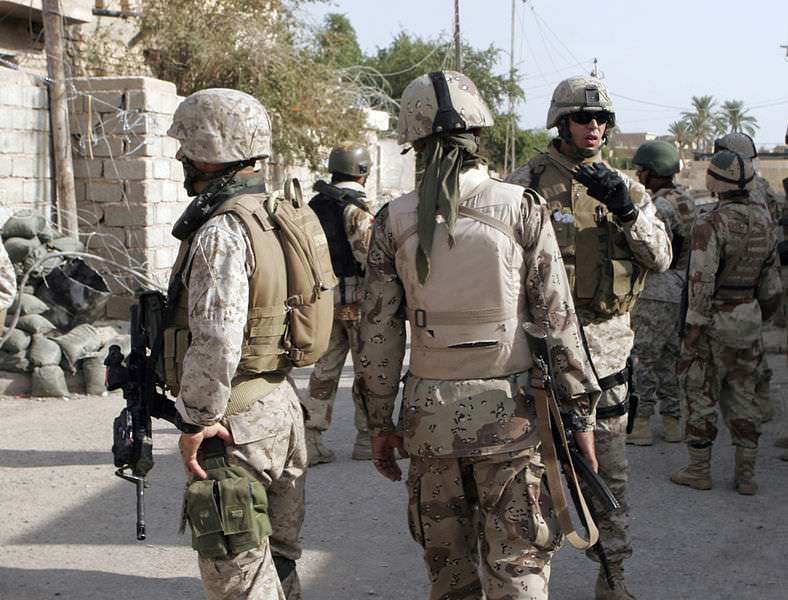Pressure Builds to Commit U.S. Troops Against ISIS; Why It's Still a Bad Idea
We may defeat ISIS at an unknown price in lives only to find that keeping the situation from deteriorating again requires putting the region under indefinite occupation.

"I will not commit you and the rest of our Armed Forces to fighting another ground war in Iraq," President Obama told an audience at MacDill Air Force Base less than a month ago. It wasn't the first time he'd made that promise, but it's one that's looking increasingly incompatible with his announced intention "to degrade and destroy" ISIS. With the American public horrified by the bloodthirsty organization/budding hellhole country (take your pick), but also opposed to committing troops to combat in Iraq and Syria, Obama and his unenthusiastic coalition have confined themselves to air strikes against ISIS facilities and assets—a strategy that doesn't appear to be getting the job done. It's increasingly obvious that the president is going to have to give ground on one commitment or the other and either abandon his efforts against ISIS or his promise to avoid a ground war.
The coalition has attempted to defend Kobani, the Kurdish city in Syria on the Turkish border, from the air, yet Kobani appears on the verge of falling to ISIS. This just days after the Pentagon warned that "Airstrikes alone are not going to do this… They're not going to save the town of Kobani."
Iraq's Anbar province, too, hemorrhages refugees fleeing from the ISIS onslaught. Provincial leaders bypassed the central government to plead for U.S. troops to do what Iraq's army is very obviously incapable of doing—stop the expansion of the area controlled by the invading radicals. More than a few American officials seem willing to satisfy that request.
Likely presidential candidate Hillary Clinton calls ISIS a bigger threat than al Qaeda. It's a strong statement, post-9/11, and one that leaves little room for anything other than escalating military efforts.
Senators John McCain (R-Ariz.) and Lindsay Graham (R-S.C.) explicitly want "a limited presence of troops on the ground."
Gen. Martin Dempsey, chairman of the Joint Chiefs of Staff, insisted two weeks ago that "12,000 to 15,000 [troops] is what we believe they would need to recapture lost territory in eastern Syria"—far more than the 5,000 warm bodies the Syrian moderates are expected to supply—though he was coy on Sunday about whether Americans might have to fill the gap.
And former Obama administration Defense Secretary Leon Panetta not only criticizes his former boss for ruling out ground troops, but thinks we should have never withdrawn the forces we had there for eight years after the 2003 invasion.
But what about those forces? Senators McCain and Graham are big believers that the 2007 "surge" of 30,000 troops to Iraq successfully stabilized the country and ended a cycle of violence. Though this is often forgotten, so was Barack Obama after the fact; he said in 2008 that the surge "succeeded beyond our wildest dreams."
The surge temporarily smothered violence so long as Iraq was under U.S. occupation, but it didn't achieve a major goal: political reconciliation among rival factions so that a viable country could be created in the absence of American forces. Or, as Bush administration Secretary of State Colin Powell said of the 2003 Iraq invasion, "you break it, you own it." He explicitly clarified his point to The Atlantic in 2007, noting, "when you take out a regime and you bring down a government, you become the government." And you're stuck until the place you've invaded is capable of establishing some sort of independent order in your absence.
But even as Iraq falls piece by piece to ISIS seven years later, the Kurdish regional government and the central government only belatedly begin to work together. Far worse, Shia militias actually murder their Sunni countrymen, blaming them for the radical group's gains.
Iraq is not a country where the surge paved the way for reconciliation, or where the people are ready to join together to control their fate. Putting U.S. troops on the ground in Iraq and Syria risks a surge-style "success." We may defeat ISIS at an unknown price in lives only to find that keeping the situation from deteriorating again requires putting the region under indefinite occupation.
But that looks like the direction in which the administration is moving. The State Department has been eagerly negotiating with Turkey for access to its military bases—so eagerly that it prematurely announced a deal for their use. The bases could be used for training more moderate Syrian fighters and launching further airstrikes, neither of which, as the Pentagon points out, are getting it done.
Turkey could also act as an effective staging ground for a ground war against ISIS. Turkish Foreign Minister Mevlut Cavusoglu says, "You need to take into consideration all options, including an operation on the ground." But he adds, "It is not realistic to expect Turkey to conduct a ground operation on its own."
You have to wonder just what's on the table in those negotiations for Turkish bases.
Meanwhile, the president of the United States remains committed to two incompatible goals: defeating ISIS and doing so without ground forces. And while Reason-Rupe polling finds 52 percent of Americans opposed to sending troops into harms way in a part of the world that has already consumed too many U.S. lives, one of those promises is going to have to give.


Show Comments (78)